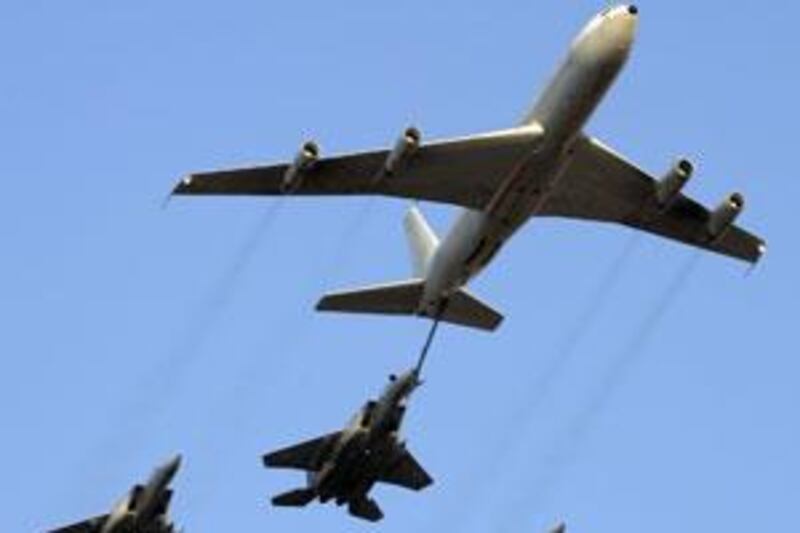TEL AVIV // Middle Eastern countries will boost their combined defence spending to more than US$100 billion (Dh367bn) in the next five years, rushing to make military purchases as regional tensions, such as the hostility between Israel and Iran, spur concerns of possible wars, a new report said this week. Frost and Sullivan, a market research and consulting firm based in California, said the biggest defence spenders in coming years in the Middle East will be Saudi Arabia, Israel, Iraq and the UAE. Balaji Srimoolanathan, manager of the aerospace and defence division at the firm, said in an interview: "This is the most important hot spot in the defence world today. In the next five or six years, the Middle East alone is going to contribute at least 10 per cent of the total global defence spending. It's a huge growth from the current seven to eight per cent of the global budget." According to the report, countries like Saudi Arabia, the UAE and Israel are spending a "huge chunk" of their gross domestic product on defence. Defence companies, hurt by a slowdown in contracts from western countries, are profiting from the tensions in the Middle East, which in the past had not proved to be a lucrative market for them, the report said. Some Gulf countries, viewed with suspicion especially by Iran and Syria because they have allowed the United States to build military bases in their territories, will probably seek to protect themselves from those countries, according to the report's analysts. In turn, Iran, Iraq and Syria will probably spend to defend themselves from the threat of potential air raids and missile attacks by Israel, says the report. The Frost & Sullivan report added: "This has had a sort of domino effect on the market, resulting in tremendous market opportunity for defence companies worldwide." Gulf countries will also be driven to advance their militaries to protect their oil resources amid an expected jump in oil demand in the next decade, the report said. Commenting on the current attractiveness of the Middle East for western defence companies, Mr Srimoolanathan added: "It's the hottest topic today. The Middle East countries are coming up with huge spending towards upgrading their military systems. It's very important for European and North American players." Regional tensions will be coupled with internal security issues in driving defence spending, the report said. "Due to the high presence of non-state actors who have a [militant] and religious agenda, internal security has become one of the top priorities for countries in the Middle East." The firm's analysts said such countries include Iraq, which is seeking to upgrade its military to boost its security and counter internal violence as the United States prepares to withdraw all its troops from the country by the end of 2011. The report said: "As the US starts giving the Iraqi troops more control, the need for equipment and platforms for law enforcement would be increased ? to maintain internal calm and protect itself from potential regional aggressors. The spending might be as high as $11 billion come 2014." Analysts at the firm said the exposure of Middle Eastern countries to the sophisticated weaponry used by the US military, following its involvement in Iraq and Afghanistan, has also prompted them to seek to match their military might to that of the West. The region's countries, the report said, are most likely to stock up on such electronics products as advanced radars and surveillance technology. Countries such as Saudi Arabia are especially looking to obtain regional military superiority, according to the report. Gautam Ganapathy, a research associate at Frost & Sullivan, said in an interview: "Saudi Arabia wants to establish itself as the leading player as far as its military is concerned." The country's defence expenditure amounted to about $36bn last year, a rate that is expected to remain unchanged in the next five years, he said. Israel, whose military is backed by support from its staunchest ally, the United States, is spending about $13bn on its military this year, the second highest regional expenditure after Saudi Arabia. The report said Israel "is still expected to keep spending to stay ahead of its regional adversaries in order to protect its interests". Such adversaries especially include Iran, whose nuclear programme is viewed by Israel as the biggest threat to its existence and against which Israel has repeatedly suggested it may launch a strike. According to the report, the global financial crisis that started in September is unlikely to dent demand for defence products significantly because "threats and crisis situations" are more likely to dictate such spending than economic factors. foreign.desk@thenational.ae
DO NOT PUBLISH Defence spending set to hit $100bn by 2014
Middle Eastern countries will boost their combined defence spending to more than US$100 billion in the next five years.

Editor's picks
More from the national




